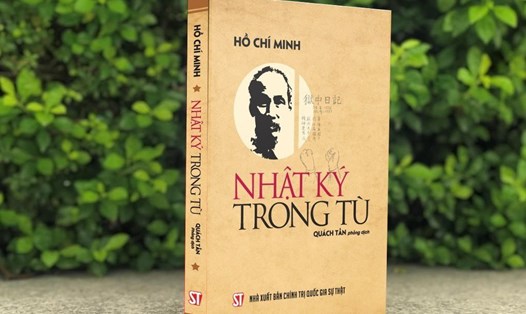The collection of author Vo Xuan Que's works on foreign translations is a vivid testament to the enduring vitality and lasting human and artistic value of the work.
A journey of more than half a century spreading to five continents
"Sign of the imprisonment" - a collection of poems composed by President Ho Chi Minh during his time in prison at Tuong Gioi Thach (1942-1943), is a symbol of strong will, human soul and revolutionary intelligence. With 133 poems in Chinese characters, the work expresses optimism, patriotism, the desire for freedom and human love.
From a simple handwritten version, the poetry collection has been translated into at least 37 languages with 62 translations by 79 translators worldwide - according to Dr. Vo Xuan Que's collection. Each version is not only translated but also conveys the depth of thoughts, emotions and the humanistic value of the poem, expressing the respect of international friends for President Ho Chi Minh.
Author Vo Xuan Que - who spent many years researching, collecting and introducing translations of "Nhat ky in tu" said that accessing all 62 translations is not simple because of limited costs, time and personal conditions. However, he has tried to collect as much information as possible about the translator's name, translator, publisher, year of publishing and number of poems or page numbers - valuable data that helps researchers and readers interested in looking up, learning and continuing to supplement.
One of the interesting things he discovered was that there were three different Spanish translations of "Nhat ky den tu", instead of just one version as previously known in Vietnam ( translated by a Cuban poet). There are even two Spanish minority language translations, Basque and Galicia. These cultural regions that are very far from Vietnam in both geography and tradition pay special attention to a poem by a revolutionary leader from the East.
Other perspectives from international readers
Not only helping to spread the image of President Ho Chi Minh as a revolutionary, the translations of "Nhat ky den tu" also help international readers recognize another aspect of him - a poet, an artist with a sensitive heart, profound intelligence and a mindset full of human philosophy. This is clearly demonstrated through articles, introductions and accompanying comments in many translations.
For example, The Nation (USA) in 1968 posted an article with the title: "The Vietnamese Leader is also A Pet - the leader of Vietnam is also a poet", from the English translation "Prison Diary". This was the time when the anti -American resistance war in Vietnam was in a tough stage, but the Americans still found in the poems of President Ho Chi Minh a value beyond the battle line - it was humanity, art, the beauty of the spirit of freedom and resilience in adversity.
The Polish translator and his wife wrote in the First half of the translated book: "With short poems, usually just four sentences, Ho Chi Minh has painted realistic paintings of his and his fellow prisoners' suffering in a humorous and profound way. His poems are small masterpieces".
Meanwhile, the translator Galicia - who died 7 years to complete the translation shared: "Despite suffering, illness and fear surrounding him, Ho Chi Minh still found strength to write optimistic and humorous poems. The short poems were ingenious in the darkness of the cell.
"Nhat ky trong tu" is not only a work of special artistic and historical value of Vietnam but also a heritage of international poetry competitions. The dedicated translations of global translators have contributed to bringing the image of Ho Chi Minh - a poet and humanistic person - closer to humanity.
The work "Sign in Prison" in foreign languages by Vo Xuan Que (Information & Communications Publishing House, March 2025) is an important contribution to literature, history, culture and people's diplomacy. The work opens a new approach to Ho Chi Minh heritage research, affirming the global position of poems in the world's literary treasure trove.








